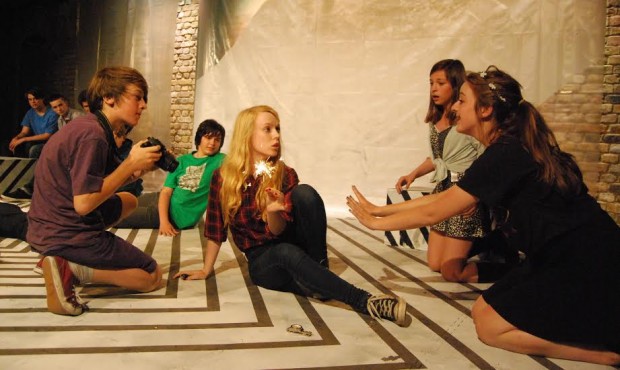You have no items in your cart. Want to get some nice things?
Go shopping
How to Make Your Soul Grow is the latest offering from Arcola Youth Theatre, a slick adaptation of three Kurt Vonnegut short stories. The name is fitting; it is taken from a letter written by Vonnegut to a class of schoolchildren in 2006, asking them to value art (indiscriminately – he encourages “music, singing, dancing, acting, drawing, painting, sculpting, poetry, fiction, essays, reportage”) for the benefit of their souls. And in this production at the Arcola Theatre fifty East London teens submit to Vonnegut’s advice with enthusiasm.
Three separate performances take place within the production, each overseen by its own director and brought to life by different ensembles of actors. The first, “Harrison Bergeron”, is a grim tale of political oppression, portraying a dystopian future in which all humans are forced into equality by the physical and mental handicapping of the gifted and the beautiful. But the equality is merely nominal. Vonnegut – a loyal disciple of Orwell – is careful to leave those in charge without handicaps, and the eponymous Harrison Bergeron determines to rebel, meeting an unhappy end.
Vonnegut’s “The Euphio Question” provides inspiration for the second performance, a story in which the sound of the stars is harnessed for human pleasure. Here, three fluent narrators inform us of the anxiety of the sound’s inventor in anaesthetising entire nations with the state of euphoria it induces, a social sedative which draws comparisons with Huxley’s drug soma. The impact of the “euphio” is shown upon a smattering of different groups in this adaptation, often to comic effect.
Finally, “Unready to Wear” tells of a future of amphibious living, in which humans learn how to shed their bodies. Vonnegut’s story is employed loosely; rather than focussing on the feel of amphibiousness, director Nick Connaughton concentrates on the social repercussions of living free from the confinements of form. The result is interesting, and his bid to portray amphibiousness through abstract dance a gallant one.
Despite their age, these stories translate well to the modern stage. There isn’t too significant a leap between the numbed consumption of “euphio” in “The Euphio Question” and today’s Netflix binges, and the question of synthetic happiness is one which preoccupies us still. The relevance of these dystopias feels somewhat unsettling; reactionaries in “Harrison Bergeron” use social media to voice their dissent, and the news of human amphibiousness in “Unready to Wear” is broken by a “vlogger” in a video projection between scenes. Upon occasion, however, removing these stories from the context in which they were written serves to change their message quite significantly. Total equality in the 1960s, when Vonnegut wrote “Harrison Bergeron”, was embodied by the grey uniformity of Soviet Russia, and his story – in which the intelligent and the strong are levelled into mediocrity – demonstrates the pervasive fear of spreading communism in the Cold War. In today’s world – a post-apartheid world, a post-Stonewall world – the idea of total equality carries with it very different connotations, a development which appears to have been overlooked in this adaptation of the tale.
Still, the performances were delivered with impressive verve, with the actors tripping glibly between roles, joking confidently and facing moments of pathos with remarkable maturity. Very occasionally, I felt that morality prevailed over narrative; subtlety was lost in the passionate avowal of the wrongness of certain behaviours, an ethical spelling-out which Vonnegut himself shied away from. His stories perpetually resist categorization. He is no more a moralist than he is a satirist, writing with the generic slipperiness which has inspired both admiration and irritation among his readers.
Largely, however, I was captivated by the questions posed by these stories, and moved by the young actors’ delivery of them. Their enswampment in jackets far too big for them and their cheerful pizza-eating in the corridors of the theatre afterwards demonstrated an age belied by the maturity of their performances.
A short video projection was shown before each segment: Vonnegut’s letter to his Xavier High School admirers; Vonnegut on the shape of the story; Vonnegut’s rules for writing. These videos furnished us with an insight into the man behind the stories we were seeing adapted, a dissection of the writing process from its conception in mid-century America to its performance by an animated troupe of young actors in Hackney today. And the arc is fitting, for Vonnegut has long appealed to youthful readers. It was a popularity which mystified him (“I don’t want to be the Pied Piper,” he confessed), yet it is not difficult to imagine how the blackly comic tenor of his writing might find favour with adolescents, his careful blend of laughter and doom meeting with teenage approval. The choice of his stories for this company of budding performers felt appropriate, and the youth theatre’s zest for his creations was wonderful to see.
Assured, animated and challenging, the evening was a lovingly compiled tribute to this versatile – or, to borrow his own term from “Unready to Wear”, amphibian – writer, and a fine response to his encouragements to that class of schoolchildren in 2006.

About Xenobe Purvis
Xenobe is a writer and a literary research assistant. Her work has appeared in the Telegraph, City AM, Asian Art Newspaper and So it Goes Magazine, and her first novel is represented by Peters Fraser & Dunlop. She and her sister curate an art and culture website with a Japanese focus: nomikomu.com.




